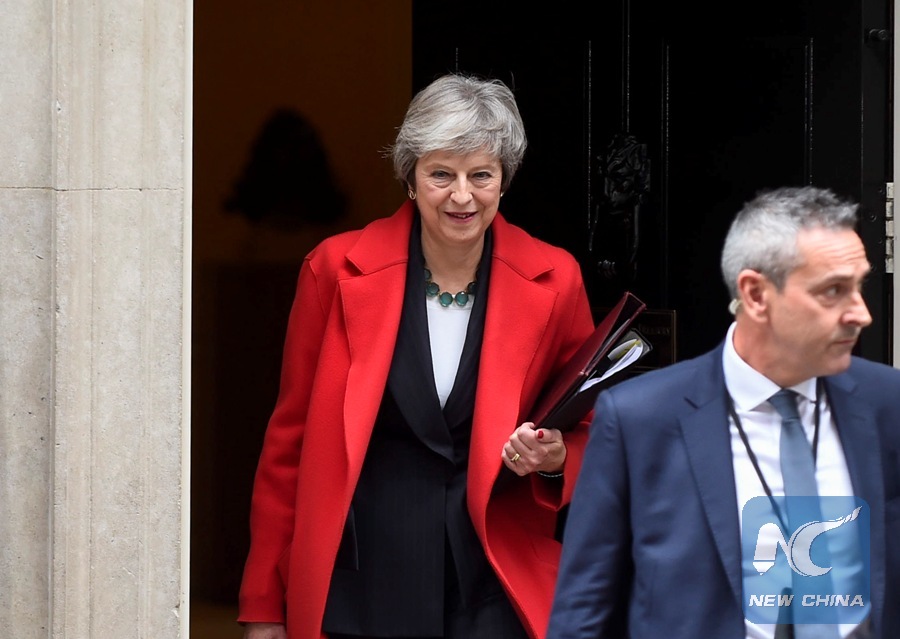
Britain's Prime Minister Theresa May (L) leaves 10 Downing Street to speak to the British Parliament on the draft Brexit deal in London, Britain, on Nov. 15, 2018. (Xinhua/Stephen Chung)
by Larry Neild
LONDON, Nov. 17 (Xinhua) -- As British Prime Minister Theresa May appointed replacements Friday for the two front-bench ministers who quit this week, a leading expert in politics predicted she only stood a 50-50 chance of winning a challenge to her leadership.
Professor Philip Cowley from Queen Mary University of London said those odds of success for her reign at 10 Downing Street are not such a good position for her to be in.
As political commentators and parliamentary correspondents in London eagerly waited to see if a challenge to May emerges, the prime minster was busy at Number 10 hiring two new ministers to take over from Brexit Secretary Dominic Raab and Works and Pensions Secretary Esther McVey who quit this week from their government roles.
Both said they could not support the Brexit agreement agreed this week by the majority of May's cabinet.
Amber Rudd, who served as Home Secretary, essentially Britain's top interior minister, was brought back into the cabinet to succeed McVey.
Raab, who only took over the Brexit hot seat in July after the first holder of the post, David Davis, resigned, was succeeded by a politician relatively known outside the so-called Westminster bubble.
Health Minister Stephen Barclay was appointed to what political commentator described as the government job no politician wanted.
Former banker Barclay, who supported Britain leaving the European Union in the 2016 referendum, was appointed to the House of Commons in 2010, representing a constituency on Cambridgeshire.
The main attention remained focused firmly on May with reports that the number of names needed to trigger a vote of no confidence in her had reached the minimum 48 required.
In what is a highly secretive procedure, an announcement of a vote will be made at some stage, and result in a vote among the more than 300 Conservative MPs.
Professor Cowley believes a no-confidence move could even give May a boost if she wins the vote among Conservative MPs who sit in the House of Commons.
"Even if she wins by one vote it would mean she could not be challenged again for a year," he said.
Cowley, a political scientist, who has co-authored a new book, The British General Election of 2017, said if May lost the vote, or decided to step down if she won only by an insignificant margin, there would have to be a leadership contest to elect a new leader and prime minister, causing a delay of several weeks to the Brexit roller-coaster.
May, he said, could be strengthened by the party's own rules which would prevent a second challenge for at least a year.
"It would immediately mean that attack would disappear. At the moment May is facing a battle on two flanks, one in parliament and the other within her own Conservative Party.
"If she won the vote of confidence by a big enough margin to carry on, and there has been talk of her winning by around 100, she would be at least able not to have to worry about another challenge from her own MPs."
Cowley said one problem for May could be Conservative MPs who had not wanted a challenge in the first place, but who had doubts about her leadership, deciding that this would be their one chance to seek a new party leader.
"My own hunch is that this would be a 50-50 chance of her winning this, and that is not a good position for a prime minister to be in."
But Cowley said May, or a successor, would have to steer the Brexit measures through the British Parliament with one possible outcome a confidence vote.
That, said Cowley, could see the Conservative government collapsing with a general election early in 2019 -- possibly around January or February.
Such an election could, he said, see Labour's Jeremy Corbyn as prime minister of a minority government, bidding to negotiate a Brexit deal or an extension to the Article 50 process that started the ball rolling in the first place to end Britain's EU membership.

